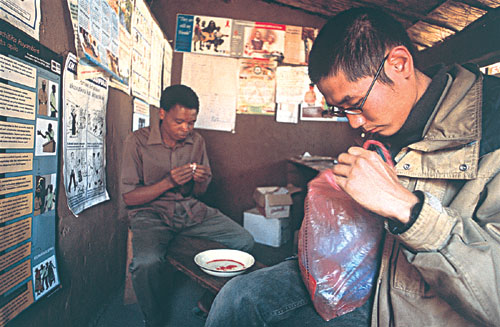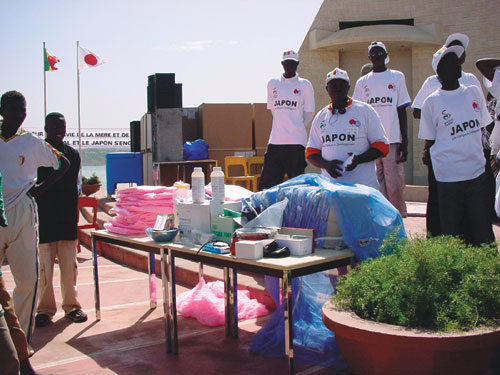Japan's Official Development Assistance White Paper 2005
Main Text > Part II ODA DISBURSEMENTS IN FISCAL YEAR 2004 > Chapter 2 Details and New Policies about Japan's ODA: Striving for Further ODA Reforms > Section 2. Measures for Each of the Priority Issues > 3. Addressing Global Issues > (2) Infectious Diseases
(2) Infectious Diseases
Infectious diseases such as HIV/AIDS and tuberculosis not only pose a threat to the health of individuals in developing countries, but now also act as a serious hindrance to the economic and social development of these countries. Moreover, because the advancement of globalization has increased and simplified human mobility, it has come to be possible for infectious diseases to easily spread to other countries across borders. As such, infectious diseases have become a global issue that must be tackled through international cooperation. From this point of view, Japan emphasized the importance of infectious diseases at the G8 Kyushu-Okinawa Summit held in July 2000 and announced the Okinawa Infectious Diseases Initiative ( IDI ). Such developments called upon international attention to measures for the issue and led to the establishment of the Global Fund to Fight AIDS, Tuberculosis, and Malaria ( GFATM , hereafter referred to as the Global Fund) in January 2002. The importance of measures against infectious diseases was also raised in the action plans adopted at the G8 Evian Summit in 2003 and the G8 Sea Island Summit in 2004.
Based on the IDI, Japan has been carrying out comprehensive measures to fight infectious diseases in developing countries through bilateral and multilateral assistance. While IDI states a plan to offer US$3 billion to support such measures over five years starting in 2000, Japan had already extended by FY2003 assistance of over US$4.1 billion over four years.
Furthermore, the amount of assistance that Japan and other donor countries pledged to extend to the Global Fund has reached a total of approximately US$5.5 billion. At the present time US$3.3 billion has already been extended, including US$327.4 million provided from 2002 to April 2005. Thus far, cooperation projects worth US$3 billion have been approved for implementation in nearly 130 countries. Of this amount, 56% was provided for AIDS, 31% for malaria, and 13% for tuberculosis. By region, 61% was provided to Sub-Sahara Africa; 23% to Asia, the Middle East and North Africa; and 16% to Eastern Europe, Central and South America, and the Caribbean. Through the implementation of these projects, anti-retroviral drugs were administered to 1.6 million AIDS patients; HIV prevention service was provided to 52 million people; Directly Observed Treatments, Short Course ( DOTS ) 30 was given to 35 million tuberculosis patients; malaria treatment drugs were distributed to 145 million people; and 108 million mosquito nets were given out. From these efforts, positive outcomes are expected. Moreover, at the Commemorative Symposium on the Fifth Anniversary of the Kyushu-Okinawa Summit, held in Japan at the end of June 2005, Prime Minister Junichiro Koizumi announced that the contribution to the Global Fund would be increased by US$500 million for the time being.
Regarding new infectious diseases such as Severe Acute Respiratory Syndrome ( SARS ) and the avian influenza in recent years, Japan will cooperate with relevant international organizations including WHO and FAO to implement various countermeasures. The specific efforts in FY2004 for each major infectious disease are as follows. (See 1 (2) of this Section for health-related efforts made in areas other than infectious diseases.)
A. HIV/AIDS
It is estimated that approximately 40 million people had globally been infected with HIV or had developed AIDS by the end of FY2004. 31 Specific plans for achieving the 3 by 5 Initiative, *1 which was launched by the WHO and the Joint United Nations Programme on HIV/AIDS ( UNAIDS ), include the training of 100,000 healthcare workers. In order to respond to the growing needs to treat and prevent HIV/AIDS, it comes to be globally urgent to train such workers. In this area of assistance to developing countries, Japan has been contributing to HIV/AIDS prevention activities for young people and high-risk groups, voluntary counseling and testing ( VCT ) activities, and the development of AIDS testing and diagnostic systems, among other measures. In FY2004, Japan supported the "Strengthening HIV Resilience in Thailand Mobile Populations Source Communities" implemented by UNDP in Thailand, through the Trust Fund for Human Security and other means. In November 2004, Japan hosted an HIV/AIDS workshop in Tokyo, to which health administration officers involved in dealing with HIV/AIDS, and physicians, nurses, and other employees from major hospitals who are engaged in the care and treatment of HIV/AIDS and the training of healthcare workers were invited from ASEAN countries. Furthermore, through the UNAIDS, Japan has worked to grasp the global trends in HIV infection, promoted the development of vaccines and new AIDS treatments, and developed guidelines for AIDS control measures and others.

JOCV working with the local resident to make red ribbons, which are symbol of understanding and assistance for HIV/AIDS (Malawi) (Photo: JICA)
B. Polio
Polio has been completely eradicated in the western Pacific region, 32 which was declared by the WHO as a polio free area in 2000. It is going to be eradicated from nearly the entire world. Through cooperation with UNICEF and WHO, Japan has been providing active assistance for the dissemination of polio vaccinations in the South Asian and African regions, where polio has not yet been eradicated. At the G8 Evian Summit in 2003, Japan pledged to provide US$80 million in assistance over three years until 2005 toward the eradication of polio from the world. Of the pledged amount, which is the second largest after the United States, approximately US$40 million was extended in FY2003 and approximately US$30 million in FY2004. Furthermore, Japan, in concert with other G8 countries, called to the international community for support to eradicate polio. Specifically, for example, Japan extended assistance to the Polio Eradication Programme (provision for polio vaccinations) for Egypt, India and Pakistan and to the Project for Infectious Diseases Prevention for Children (provision for polio and measles vaccinations) for Bangladesh, Sudan, the Democratic Republic of the Congo, Ethiopia, Ghana, Sierra Leon and Nigeria; as well as dispatching experts and JOCV members.
C. Tuberculosis
In order to expand the implementation of the DOTS strategy, Japan has been providing anti-tuberculosis drugs and testing equipment particularly to the most seriously affected countries, including those designated by the WHO as tuberculosis priority countries. In FY2004, Japan sent anti-tuberculosis drugs and testing equipment worth a total of over ¥400 million to countries including China. In addition, Japan dispatched experts to countries including Cambodia and Afghanistan, and provided assistance directed at establishing local programs for combating tuberculosis and strengthening their activity bases. Through these efforts, Japan is contributing to the expansion and dissemination of DOTS.
D. Malaria
In order to contribute to combating malaria in Africa, Japan announced its intention to provide 10 million long-lasting insecticide-treated nets by 2007. The use of such nets is expected to prevent the deaths of up to 160,000 children in Africa. As part of this effort, in FY2004, Japan provided 240,000 long-lasting, insecticide-treated nets to Sudan. The nets were also provided to Ghana, Sierra Leone, Angola, and other countries. (See also 3 B of Part I, Chapter 2, Section 3 for malaria control measures.)

Supplied bed nets, insecticides, and other equipment to counter malaria (Senegal) (Photo: Japan International Cooperation System)
E. Parasitic Diseases
Japan has been conducting human resources development and research activities for the purpose of controlling parasitic diseases including malaria, in the International Parasite Control Centers that have been established in Thailand, Kenya and Ghana. Japan has been also making efforts to combat guinea worm, filariasis, soil-born parasites and others, through support from NGOs and JOCV. Particularly toward eradication of the guinea worm, Japan has been making the second biggest contribution after the United States. The number of worldwide people infected with the guinea worm declined by 98% from approximately 3.5 million in 1986 to approximately 55,000 in 2002. Japan continues its efforts toward the eradication of the guinea worm from the entire world. To combat filariasis, the WHO launched the Programme to Eliminate Lymphatic Filariasis, based on the know-how offered by Japan, which succeeded in its eradication in the 1970s. As part of this effort, for example, programs have been developed to eradicate filariasis by 2010 in the Pacific Island countries. In March 2005, the Workshop on Global Parasite Control 2005 was held in Tokyo, and the Hashimoto Initiative for global parasitic disease control over the past five years was reviewed, confirming the effectiveness of the parasite control measures implemented through the promotion of school-based health.
In implementing these efforts, Japan has been also actively collaborating with international organizations such as UNICEF, the WHO, UNAIDS and others, and with the United States and other donor countries. In addition, a number of measures against HIV/AIDS and other infectious diseases are being implemented through funds established with contributions from Japan. These funds include the United Nations Trust Fund for Human Security; the Japan Trust Fund ( JTF ) for HIV/AIDS, of the International Planned Parenthood Federation ( IPPF ), which is an international NGO; the UNESCO Japanese Funds-in-Trust for the Capacity-Building of Human Resources and the Special Trust Fund for AIDS Education; and the World Bank Japan Social Development Fund. Besides financial contribution to the Global Fund, Japan has also been serving as a member of its administrative board, which is the highest decision-making body of the Global Fund.
In fact, however, Japan has a low level of awareness domestically regarding the threat of these three major infectious diseases (HIV/AIDS, tuberculosis, and malaria), and few people know about the Global Fund. Therefore, in order to deepen Japanese people's understanding of activities of the Global Fund and of infectious diseases, and in particular with a view to promoting the cooperation related to infectious diseases with other East Asian countries, Japan established the "Friends of the Global Fund, Japan," the first of its kind in the world, in June 2004. This group is headed by former Prime Minister Mori, and its members include researchers, private sectors, NGOs and government officials. In June 2005, "Friends of the Global Fund, Japan" hosted the "Commemorative Symposium on the Fifth Anniversary of the Kyushu-Okinawa Summit: East Asian Regional Response to HIV/AIDS, Tuberculosis and Malaria," and discussions took place regarding the current situation of infectious diseases in East Asia, as well as strategies for promoting regional cooperation. On this occasion, Prime Minister Koizumi announced that Japan would increase its aid to the Global Fund by US$500 million for the time being.
Chart 18. Disbursement of the Okinawa Infectious Diseases Initiative (IDI) (FY2000-2003)

In addition, as an extensive cooperation, Japan has launched the "Japan-ASEAN Information and Human Network for Infectious Diseases Control" for HIV/AIDS, tuberculosis, and malaria in the Asian region, where Japan's experience of fighting infectious diseases is more applicable, and has been promoting the control of infectious diseases in the ASEAN region.


 Next Page
Next Page